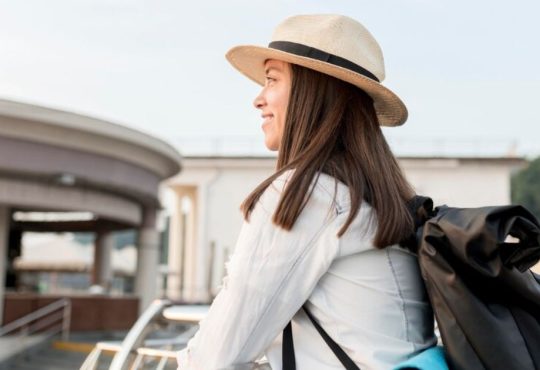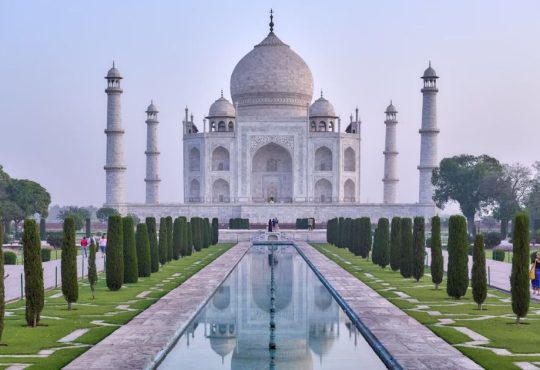With its sacred origins, golden deserts, and soaring modern marvels, Saudi Arabia has quickly become one of the world’s most intriguing travel frontiers. Thanks to the Vision 2030 initiative, the Kingdom is welcoming tourists with open arms, offering everything from Mecca’s sacred sites to the rock-hewn wonders of AlUla and the dynamic energy of Riyadh. However, many safety concerns still arise due to the country’s geopolitical landscape and cultural norms. So, what’s the verdict—is Saudi Arabia a safe destination in 2025? This article explores the current safety outlook, including crime, terrorism, cultural etiquette, health, and transport, to help travellers confidently plan.
How Safe Is Saudi Arabia to Travel in 2025?
1. Understanding Saudi Arabia’s Transformation
To assess safety, it’s crucial to understand the context of Saudi Arabia’s rapid transformation. Vision 2030, launched in 2016, aims to diversify the economy beyond oil, with tourism as a key pillar. The government has invested billions in projects like NEOM, a futuristic city, and AlUla, a cultural heritage hub, while easing restrictions to attract visitors. Since 2019, tourists from over 60 countries can obtain e-visas online, which takes minutes, making access easier than ever. Women can now drive, travel alone, and dress more freely, and public entertainment—once limited—now includes concerts, festivals, and cinemas.
These changes have reshaped perceptions of safety. Major cities such as Riyadh, Jeddah, and Dammam are modern, well-secured, and boast infrastructure on par with leading global capitals. The crime rate is low, with violent crime infrequent, thanks to stringent law enforcement and cultural conservatism. According to the 2023 Global Peace Index, Saudi Arabia ranks 130th out of 163 countries—a sign of growing stability. The Kingdom has seen notable improvements, including a 5% decrease in overall crime and a 6.5% drop in violent crime compared to previous years. However, challenges remain, including regional tensions, strict legal codes, and cultural sensitivities that travellers must navigate.
2. Crime Variety and Personal Safety
Saudi Arabia boasts one of the lowest crime rates globally, driven by its conservative societal norms and robust security apparatus. Petty crimes like pickpocketing or purse-snatching are uncommon but can occur in crowded tourist areas, particularly during Hajj and Umrah pilgrimages in Mecca and Medina. In 2020, the General Authority for Statistics reported a 31.6% decrease in traffic-related mortality and a 33% reduction in workplace accidents, signalling broader safety improvements.
Personal safety for tourists largely depends on understanding and respecting Saudi Arabia’s local laws and cultural customs. The Kingdom operates under Sharia law, which imposes severe penalties for offences like theft, drug possession, or public intoxication. Alcohol is strictly prohibited, and bringing it into the country can lead to imprisonment or deportation. Drug offences carry zero tolerance, with penalties ranging from lengthy prison sentences to, in extreme cases, execution. Public behaviour is closely monitored—disorderly conduct, such as shouting or offensive gestures, can result in fines or arrest.
Women travellers, in particular, may wonder about safety. Reforms have significantly improved conditions: women no longer need a male guardian to travel, and the mandatory abaya (a long black robe) was relaxed in 2019. Modest dress—covering shoulders and knees—is still advised to avoid unwanted attention or legal issues, especially in religious sites. According to recent travellers’ surveys, solo female travellers report feeling safe in urban areas, with Medina often cited as one of the safest cities for women. However, as in any destination, basic precautions—like avoiding isolated places at night or using reputable transport—are wise.
LGBTQ+ travellers face unique risks. Same-sex relationships are illegal, with penalties including imprisonment or corporal punishment. Public displays of affection, even for heterosexual couples, can attract scrutiny. While authorities have stated that LGBTQ+ tourists are welcome, discretion is essential to avoid legal or social complications.
3. Terrorism and Regional Risks
Terrorism remains a concern in Saudi Arabia, though the risk to tourists is relatively low in 2025. The U.S. Department of State rates Saudi Arabia as a Level 2 advisory (“exercise increased caution”) due to potential terrorism and missile/drone attacks, with Level 4 (“do not travel”) warnings for specific areas within 20 miles of the Yemen border, including Najran, and Qatif in the Eastern Province, including Awamiyah. The UK’s Foreign Office advises against all travel within 10km of the Yemen border and non-essential travel up to 80km, citing cross-border attacks.
Yemen-based Houthi rebels have historically targeted Saudi infrastructure with drones and missiles, though a truce since 2022 has reduced incidents. Cities like Riyadh and Jeddah have faced rare attacks, often aimed at military or energy facilities, not tourist sites. Debris from intercepted projectiles poses a minor risk near borders. Terrorist groups like al-Qaeda have threatened attacks in the Gulf, but Saudi Arabia’s heavy investment in security, especially around Mecca, Medina, and Riyadh, mitigates this threat. Tourists are unlikely to encounter issues in well-patrolled urban centers, but staying vigilant in crowded places and monitoring news is advisable.
Regional conflicts, such as tensions between Israel and Lebanon or Iran’s influence in the Gulf, could escalate, though they rarely directly impact tourist areas. Enrolling in programs like the U.S. Smart Traveler Enrollment Program (STEP) or following embassy updates on social media (e.g., @KSA_ACS) ensures real-time alerts.
4. Cultural Sensitivities and Legal Risks
Saudi Arabia’s strict adherence to Islamic law shapes its safety landscape. Missteps in behaviour or speech can lead to serious consequences, even for foreigners. Key considerations include:
- Religious Sensitivities: Public practice of non-Islamic religions is illegal, though private worship is tolerated. Bringing religious texts for personal use is fine, but importing large quantities risks prosecution. During Ramadan (expected February 28–March 30, 2025), eating, drinking, or smoking in public during daylight hours is prohibited, with fines or jail time for violations. Respecting prayer times, when shops and restaurants may close briefly, is expected.
- Speech and Social Media: Criticizing Islam, the monarchy, or government policies—verbally or online—can lead to arrest under cybercrime laws. U.S. citizens have faced detention for past social media posts deemed offensive, even if posted outside Saudi Arabia. Avoid discussing politics, wearing clothing with slogans, or filming sensitive sites like palaces or military installations without permission.
- Photography: Photographing locals without consent or government buildings is illegal and could result in fines or confiscated devices. Always ask permission and stick to designated tourist areas.
- Public Behavior: Public displays of affection, loud arguments, or intoxication (even from alcohol consumed abroad) can result in penalties. During Hajj and Umrah, avoid political symbols or banners, as they’re seen as disruptive.
Compliance ensures a trouble-free visit. Hotels and tour guides often provide advice on local norms, and apps like Visit Saudi offer cultural tips.
5. Health and Environmental Safety
Health risks in Saudi Arabia are manageable with preparation. The CDC recommends standard vaccinations (e.g., measles, hepatitis A/B) and notes low COVID-19 levels as of 2025. However, specific concerns include:
- MERS-CoV: Rare cases of Middle East Respiratory Syndrome have been linked to camels, so avoid raw camel milk and undercooked meat, and wash hands regularly for protection.
- Insect-Borne Diseases: Malaria in southwestern regions like Jazan requires anti-malarial medication for visits. Dengue and leishmaniasis, spread by mosquitoes and sandflies, are risks in rural areas. Use repellent and wear long clothing.
- Heat and Sandstorms: Summer temperatures often exceed 100°F, posing risks of heatstroke. Winter (November–February) is cooler and ideal for travel. Sandstorms can aggravate allergies or breathing problems, so it’s wise to bring a mask if you’re prone to respiratory issues.
From February 1, 2025, travellers performing Umrah, Hajj, or visiting holy mosques need the meningitis (ACYW135) vaccine administered at least 10 days prior. Tourist e-visas include mandatory medical insurance covering COVID-19 treatment, but comprehensive travel insurance with medical evacuation is recommended, as trauma care is limited outside cities.
Water and food safety vary. To reduce the risk of contamination, opt for bottled water and dine at reputable restaurants in urban areas. During the Hajj (expected June 4–9, 2025), overcrowding at religious sites raises risks of stampedes or illness, so follow guides’ instructions and stay hydrated.
6. Transportation Safety
Transportation in Saudi Arabia is generally reliable but requires caution:
- Driving: Roads are modern, but reckless driving is everyday, with high accident rates. In 2020, traffic accidents dropped by 20%, but speeding and lax enforcement persist. Renting a car with a valid international driving permit is straightforward, but consider hiring a professional driver for safety. Women have drive legally since 2018.
- Taxis and Ride-Sharing: Use licensed taxis or apps like Uber or Careem, available in major cities. Steer clear of unmarked taxis and avoid sitting in the front seat. Pre-arrange pickups where possible.
- Public Transport: Buses and the Haramain high-speed rail (connecting Mecca, Jeddah, and Medina) are safe and efficient. Make sure to book rail tickets in advance for weekends or during the Hajj season, as demand tends to surge.
- Aviation: Saudi Airlines meets international safety standards, per the FAA. King Abdulaziz International Airport in Jeddah and King Khalid in Riyadh are major hubs with good facilities. Avoid unscheduled local flights in remote areas.
Walking in cities is safe during the day, but nighttime strolls in less populated areas should be avoided. Always carry ID—a passport copy or digital Iqama (for residents)—as police may request it.
7. Regional Variations in Safety
Safety varies by region:
- Riyadh: The capital is a modern city with strong security and a welcoming tourist atmosphere. Petty crime is rare, but stay cautious in crowded markets like Souq Al-Zal.
- Jeddah: This coastal city is vibrant and liberal, with safe waterfronts like the Corniche. Pickpocketing risks rise during festivals.
- Mecca and Medina: Sacred cities are secure but crowded during pilgrimages. Non-Muslims are not permitted in central Mecca, so be sure to follow all posted signs.
- AlUla: A remote heritage site, it’s very safe, with guided tours ensuring security.
- Yemen Border Areas: Due to missile risks, avoid Najran, Jazan, and areas within 20 miles of Yemen. Abha International Airport, located in Asir Province, is also marked as a location for non-essential travel.
- Eastern Province: Qatif and Awamiyah have seen occasional unrest linked to Shia minority protests. For coastal attractions, stick to Dammam or Al Khobar.
Check travel advisories before visiting less-touristed areas, and consult local guides for updates.
Practical Safety Tips for Travelers
To ensure a safe trip in 2025, follow these tips:
- Research and Prepare: Familiarize yourself with Saudi laws and customs through Visit Saudi or your embassy’s website.
- Dress Modestly: Wear loose, conservative clothing, especially in religious sites. Women should wear a headscarf to mosques.
- Stay Connected: Carry a charged phone with emergency numbers (police: 999, ambulance: 997). VPNs are useful for accessing restricted apps like WhatsApp for calls.
- Travel Insurance: Get coverage for medical evacuation, theft, and cancellations. Verify visa-provided health insurance details.
- Respect Ramadan and Hajj: Plan around these periods for quieter visits or prepare for restrictions during fasting hours.
- Avoid Sensitive Topics: Steer clear of political, religious, or royal family discussions to avoid legal trouble.
- Use Reputable Services: Book tours, hotels, and transport through established providers. Hotels like Habitas AlUla or chains in Riyadh offer concierge support.
- Stay Informed: Monitor local news and follow the embassy’s social media for real-time updates on protests or incidents.
Why Saudi Arabia Is Worth Visiting
Despite safety considerations, Saudi Arabia offers unparalleled experiences. Discover Al Rajajil, the mysterious “Standing Men” of prehistory, or hike through the stunning Asir Mountains in Abha. Savour aromatic kabs in a Bedouin tent or shop for gold in Jeddah’s souqs. The warmth of Saudi hospitality—often cited by travellers on platforms like X—adds to the appeal, with locals eager to share their culture. The Kingdom’s blend of ancient and modern, from Madain Saleh’s Nabatean tombs to NEOM’s cutting-edge vision, makes it a unique destination.
Travel Smart: Navigating Safety in Saudi Arabia
Is Saudi Arabia safe to travel to in 2025? For most tourists, the answer is yes, provided they prepare thoroughly and respect local norms. Low crime rates, modern infrastructure, and heavy security in tourist hubs like Riyadh, Jeddah, and AlUla create a welcoming environment. Risks like terrorism or legal missteps exist, but are manageable with vigilance and cultural awareness. By dressing modestly, avoiding restricted areas, and staying informed, travellers can enjoy Saudi Arabia’s rich heritage and hospitality without incident. Whether you’re drawn to its sacred mosques, desert adventures, or futuristic ambitions, the Kingdom offers a safe and rewarding journey for those who come prepared.





